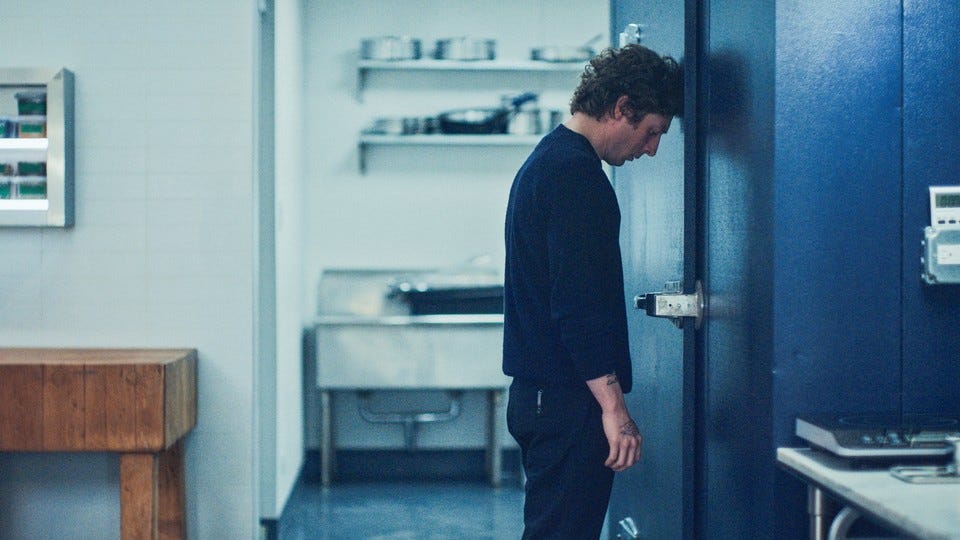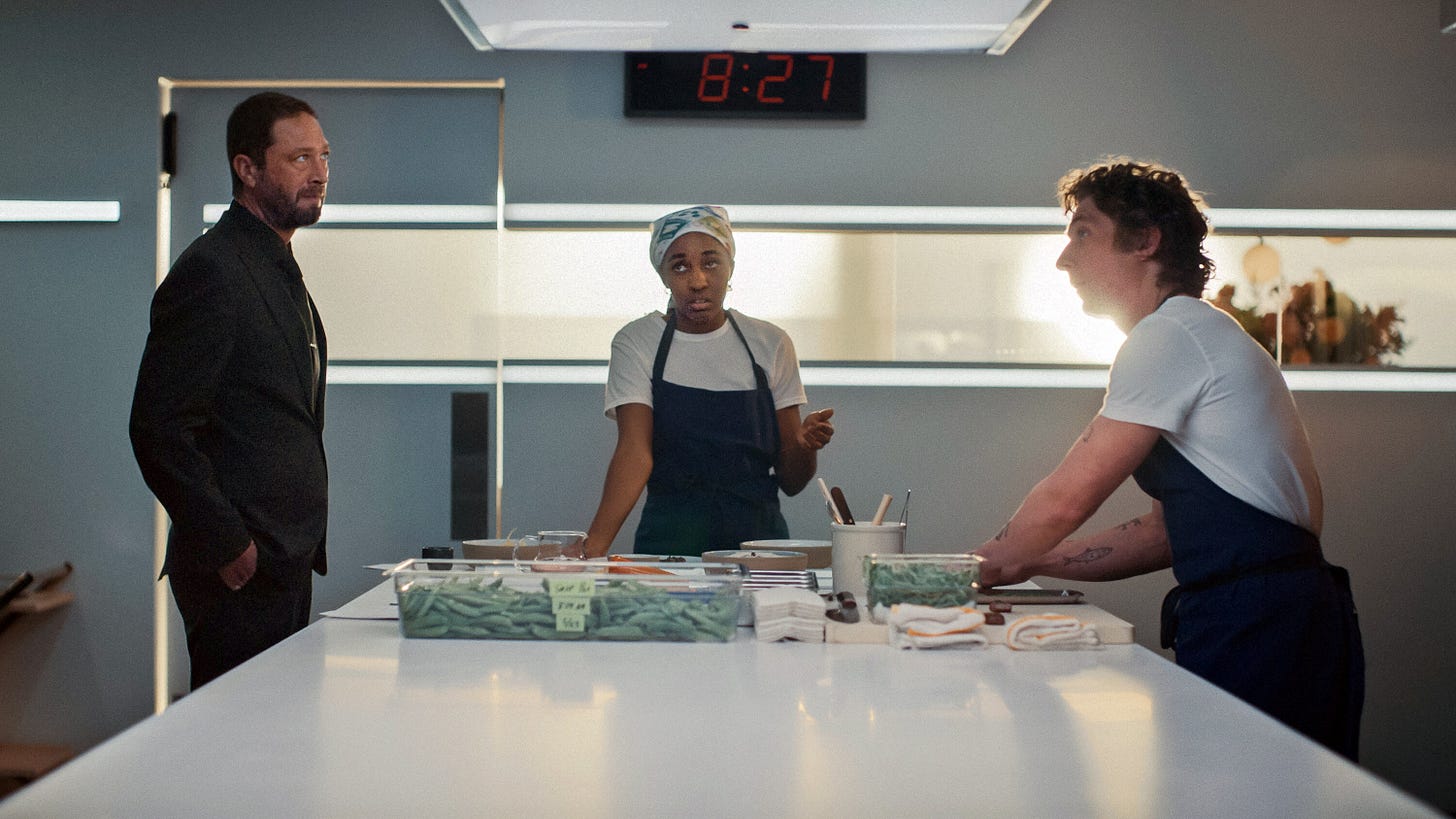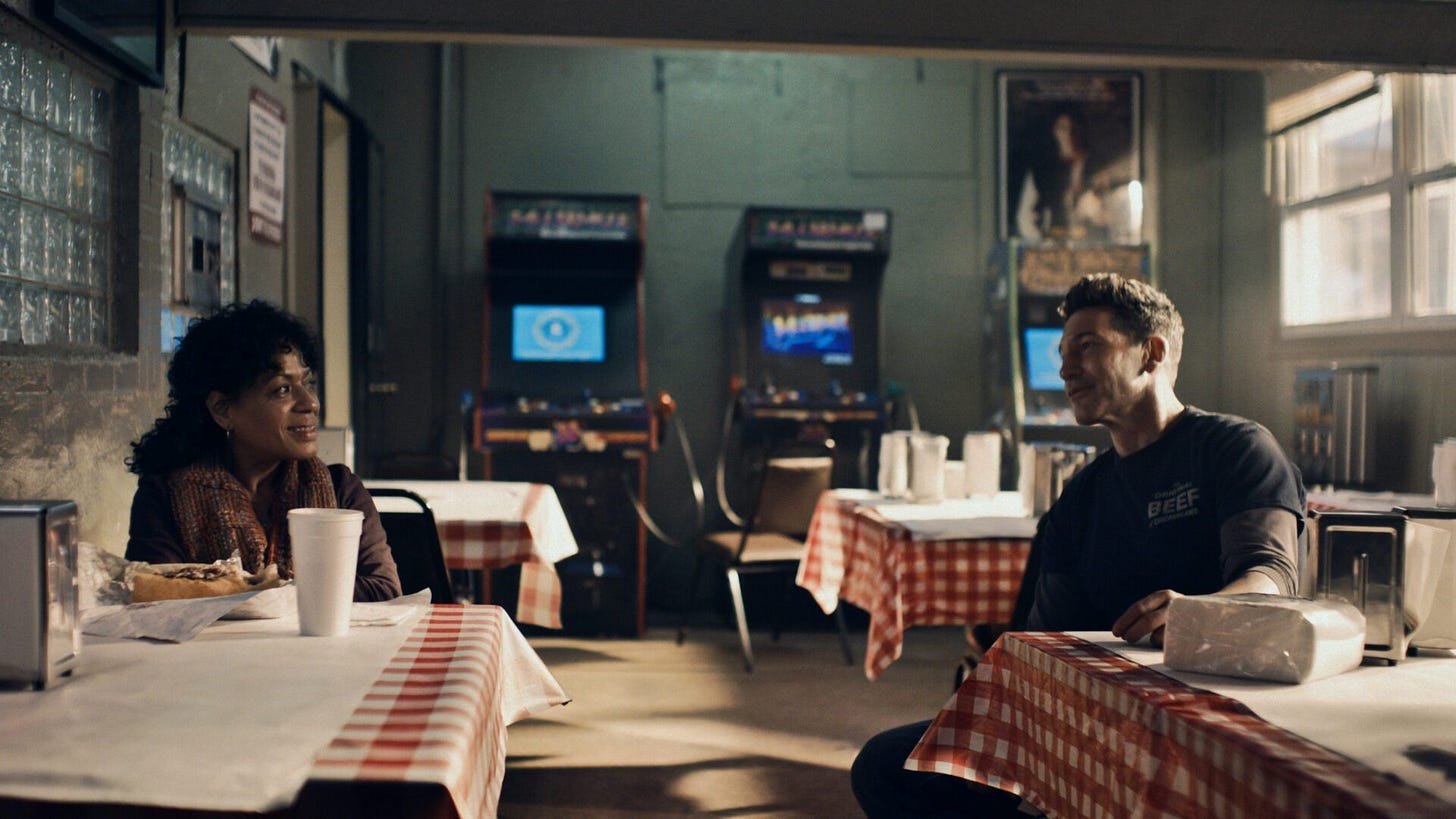I haven’t written anything outside of Outlook or Letterboxd in at least a few months, marking probably the longest drought since I started writing more seriously as a side passion. I’m not sure why that is—likely a mix of work business, a lack of overly inspiring art to write about, and some general burnout—but in any case, it took me about two minutes of The Bear’s third season to know I’d be writing about it as soon as I finished.
We’ll get to the rest of the season, but a moment for that premiere: imagine the guts it takes to open the biggest show in the world’s much-anticipated third season with a nearly dialogue-free, ambient-impressionistic blur of past and present. If people returned to The Bear after a year’s wait looking forward to seeing their Emmy-anointed faves reconciling and diving into the future of their new restaurant, they were instead greeted with simultaneously the chillest and most harrowing training montage of all time, with Carmy’s various culinary apprenticeships mingling with his various traumas, as they do. While saying very little, this episode-as-montage tells us as much about Carmy’s interiority as the show ever has: his quest for greatness haunts him just as much as the pains that inspired the quest.
To say that this third season lacks the narrative drive of the second is not a criticism but an observable fact, something the predictable critical backlash (softening?) has been quick to identify as its crucial flaw. Amid reporting that Christopher Storer always envisioned the show as a three-season arc but was coaxed by Hulu to stretch it to four, it’s easy to pin the lack of clean resolutions on simple plot overextension. But whether it was part of the original artistic intent or a byproduct of network tampering, I love this season for the way it’s able to let the endgame fade into the background and just get lost in its many cycles.
As we’ve seen, the restaurant business is an addictively iterative one. Each meal and each service is a new chance to knock it out of the park or strike out looking, and I appreciate how much Storer and co. were willing to experiment with the form and focus of this season’s ten courses. After the lead-off home run of the premiere, we get a little bit more familiarity in the second episode in that most of the main characters are together and interacting in the present, and yet it’s still something of a flex: essentially the entire episode is one escalating argument around the kitchen island. Last season’s soft opening was a success (give or take a freezer meltdown), but now they have to recreate – and improve upon – that massive endeavor every night, forever, until the restaurant dies or they do.
That Sisyphean set-up is mirrored by the third episode, which shakes up the format again with an episode/month-long supercut of services. Editors Joanna Naugle and Adam Epstein make their mark throughout the season but especially here, conducting the show’s trademark kitchen tension to a climactic boil, resulting in the expected spills and crashes and cuts but also painting a more complex picture of the job in the process. The picture is a collage: in isolation, each of the episode’s mini-episodes has a valence – sometimes triumphant, sometimes devastating – but they only tell the true story in aggregate.
The idea that the real success of the restaurant can only be earned (proven?) over time is an overwhelming one, especially considering how hard it looks for these people to even manage one good night of service. But the flip side of that coin is painted in grace: failure isn’t instantaneous either, despite how it feels when a plate breaks or a pot boils over. What can seem like a brutal reality when you’re made to start from scratch the morning after a hard-earned success can also look like a generous blank slate the morning after disaster. We’d prefer our victories eternal and our failures fleeting, but we’re cursed and blessed that they both come out in the wash.
Not that their residue doesn’t accrue. The show has always been interested in gradual growth – the way doing something right twice doesn’t mean you’ll do it right the third time, but gives you a better shot at the fourth. Just last season, some criticized how “Forks” seemingly transformed Richie from angry malcontent to suit-wearing host extraordinaire within one episode. But of course it didn’t: he’s still wearing the suit this season, but his continued yelling and forgetting show it’ll take more than one incredibly moving conversation with Olivia Colman to break him of his old habits.
So that’s the bad news. The good? Even though he’s not perfected overnight, he’s still getting better. Season One Richie would not be taking the looming marriage of his ex-wife on the chin with as much grace as he is, nor continuing to try at excellence in the face of Carmy’s disrespect. He’s still stuck in a cycle because so are we all, always, but he’s doing the hard work of trying to flip his from a negative to a positive feedback loop, centered on what’s already good in him: his unwavering love for his daughter. It can’t cure him alone, but a convo with Colman can offer a little perspective shift that gets the gears turning in the right direction.
Carmy, meanwhile, is suffering from the opposite problem. Season two’s climactic freezer meltdown seems to have undercut many of the strides he made toward bettering himself ahead of the restaurant’s opening. Rather than affirming that his healthier choices actually empowered his chefs to succeed without him, he can’t read his being locked up as anything but a personal failure, the proof he needed that he can’t escape the prison of his inheritance.
That’s the other kind of cycle the show (and especially this season) is interested in: the ones we inherit from parents, bosses, mentors—and the ones we worry about passing on. Whatever support he might show Marcus when the pastry chef’s mom passes, Carmy can’t take his own advice; in viewing his hand-me-down traumas as a poison only he can sweat out through an exhaustive pursuit of perfection, he unwittingly becomes a self-fulfilling prophecy.
It’s not a victimless crime, either, since Sydney is especially bound to the ship Carmy seems intent on sinking rather than letting anyone else plug a hole for him. Or not bound—much of Syd’s internal conflict this season is made manifest in her deliberation over the partnership agreement Carm and Nat have drawn up for her. Potential (loving) dad issues aside, Syd seems to have a much healthier approach to the cycles of her own life and is instead stuck trying to decide whether to get sucked into Carmy’s, for better or worse.
She’s obviously inspired by him: the season premiere movingly shows us that Syd’s life-changing meal in NY was the product of Carmy’s obsessive tinkering—the potential upside of his hunt for perfection. But despite his repeated (and decreasingly effective) apologies to her, it’s clear his spiraling is taking its toll. Success is more firmly in Carmy’s sights than ever, but it's blinkering him to everyone else’s needs and values, leading him to act more like his horrible former boss (Joel McHale) than he has since early in the first season.
People have criticized the decision for Carmy to go full “I picked the wrong week to quit cigarettes” mode for most of this season, but there’s something true-to-life about swapping one demon for another. In his withdrawal-heightened obsession with perfection, the suite of possible role models narrows to those cruelly willing to do whatever it takes. That’s how what starts as an attempted telling-off of that evil former boss in the finale morphs into Whiplash in miniature, with Carmy left wondering if the cruelty he was submitted to is what made him great, and if that same cruelty is necessary to drive those around him to similar heights.
The great tension of this season is that we don’t even have to look outside of the episode (or the restaurant!) for counterevidence of a gentler excellence. The finale begins with a flashback to Carmy’s time at French Laundry, with Chef Thomas Keller (whose excellence is never in question) taking time to kindly teach Carmy how to truss a chicken. The McHale confrontation is then bookended by Carmy’s convo with Colman’s Chef Terry—one of his biggest inspirations, whose empathetic greatness has brought a whole dining room full of master chefs to her funeral service, many of whom get to espouse their own kinds of kindness to a notably affected Syd.
Chef Terry couldn’t be more of an opposite to McHale’s Chef David, and in explaining her reasons for quitting (and in asking Carmy to drop the “Chef” when addressing her), she can’t help but emphasize the human ingredient that David seeks to sublimate. She did what she wanted to do, with the people she wanted to do it with, and now she’s quitting to live. That sentiment echoes many of the people around Carmy, if only he’d listen. As the superb flashback episode “Napkins” shows us, the upending of Tina’s work life had her longing for the same familial routine Carmy’s been treating like purgatory. Even Mikey, for all his demons, recognized that the people were the most important part of the journey, not a chaos factor to mitigate.
The rest of the kitchen seems to get it, too—just see how many of them choose to come in on their day off, grateful for some peace and quiet in which to work on their craft. Marcus, having just lost his mother, is cooking with care, working out his pain through the iterative cycle of designing a dessert homage while Carmy gives himself conniptions over the tiniest steak in the world. Nat, so worried about passing her inherited issues onto her baby, is able to stare the origin of her personal tornado in the eye and come away with a clean(er) path toward reconciliation.
The cycles themselves are not the issue. A small but inspirational thing I think about a lot is the brief stint D’Angelo Russell had on my beloved Golden State Warriors, during which he would often post practice pictures captioned: “Got better today.” Russell’s failure to launch in Golden State aside, I thought of D’Lo when Thomas Keller is talking to Carmy about legacy—about coming in each day to just do a little bit better than the day before in order to play a significant (if invisible) part in their patrons’ lives.
“Just remember, it’s all about nurturing,” Keller says to a guy who’s spent this season doing the opposite. But Carmy isn’t as far away as he thinks; he’s got the “trying to be better every day” bit down, he’s just approaching it with the wrong motivations—or at least with motivations that are toxically entwined with his insecurities. All he has to do is pick a North Star (ideally, the Chef Terry/Keller kind) and allow his cycles to spin himself toward a humbler glory, rather than blindly chasing a black hole.
There’s been talk about unsatisfying finales and unresolved arcs, but at the risk of being glib, how often are our own arcs resolved? Season three’s capper would’ve been completely unsatisfying as a series finale, but it’s not one. We spend more of our lives attempting to untangle our own knots and waiting for the reviews that will make or break us (for a cycle, at least) than actually receiving answers, and it’s fitting for a show so concerned with greatness to take a season to explore what it’s like when it eludes us.
That may not be as pulse-pounding an arc as the rush to open a new restaurant, but it is an arc—or at least the first half of an arc, artfully told through the less-than-linear slices (stabs?) of life that you can afford when your season gets stretched into two. It’s a little less like this era of prestige television and a little more like the Lost days of endless episode runs, where Damon Lindelof got to deepen his characters and mirror the cycles and breakthroughs of life in his idiosyncratically thrilling way.
I didn’t enjoy seeing Carmy’s stalled progress this year any more than Carmy did, but maybe we should let him—and Chris Storer—cook. After all, this season is a little more like life, too. Seasons of finding tend to follow seasons of seeking, and I have no doubt in the world that Carmy will emerge from his many cyclones to discover a healthier perspective. True to the show, it’ll no doubt be one shaped by the many great (and crucially, good) people in his orbit, one that reimagines the never-ending turns of service as a mechanism for self-refinement and collective striving rather than a medieval torture device. We should all be so lucky!









